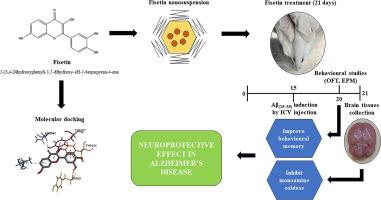In silico and in vivo evaluations of fisetin and fisetin-loaded nanosuspension on monoamine oxidase inhibition in Aβ(25–35) induced dementia in mice model
Pharmacological Research - Modern Chinese Medicine
Pub Date : 2024-11-12
DOI:10.1016/j.prmcm.2024.100547
引用次数: 0
Abstract
Background
Amyloid beta (Aβ) plaques on the extracellular matrix and intracellular neurofibrillary tangles comprise the key indicative pathology of Alzheimer's disease (AD). Fisetin, an antioxidant bioactive compound having pharmacotherapeutic effects is applied by traditional Chinese medicine (TCM) such as Toxicodendron vernicifum (Chinese lacquer tree), Cotinus coggygria Scop, Gan Shuang granulates and formula of Acacia catechu-Scutellariae Radix. Nevertheless, fisetin has constraints such as low oral bioavailability, insignificant aqueous solubility and high hepatic metabolisms.
Objective
This investigation aimed to envisage the effects of fisetin and its optimised nanoformulation on Aβ(25–35) desirous neurotoxicity in mice through deciphering inhibitory actions against monoamine oxidase A and B (MAO-A and B) enzymes following molecular docking.
Methods
Molecular docking with MAO-A and B enzymes were accomplished by AMDock's integrated AutoDock Tools (ADT) scripts. For in vivo studies, fisetin nanosuspension was prepared by nanoprecipitation method and evaluated for standard characterization. 10 and 20 mg/kg of fisetin and 10 mg/kg of fisetin nanosuspension were given once daily to mice for 21 days. On the 15th day, the mice were challenged with Aβ(25–35) by intracerebroventricular injection (ICV) and behavioural tests (open field and elevated plus maze) were performed on the 20th day. Biochemical and histology were examined in brain tissues.
Results
Fisetin docked to the catalytic positions of MAO-A and B, unveiling good binding scores and molecular interactions with amino acid residues for inhibition activities. Fisetin nanosuspension has average particle size (225.4 ± 2.95 nm) with low polydispersity index (0.19) and standard zeta potential (-19.13 ± 1.17 mV). Findings showed that fisetin increased locomotor activity and reduced anxiety-like behaviour. Fisetin and its nanosuspension significantly reduced the concentration of MAO-A (P < 0.01) and MAO-B enzymes suggesting a potential neuroprotection effect in Aβ peptide-induced amnesia in mice.
Conclusion
Fisetin with optimized bioavailability, effectively exhibits neuroprotection through molecular interactions of MAO enzymes. Further investigations affidavits the neuroprotection through bidirectional pathways related to biogenic amines and their deamination on Aβ stress conditions.

鱼腥草素和鱼腥草素纳米悬浮液对 Aβ(25-35)诱导的小鼠痴呆模型中单胺氧化酶抑制作用的硅学和体内评估
背景细胞外基质上的淀粉样β(Aβ)斑块和细胞内的神经纤维缠结是阿尔茨海默病(AD)的主要病理指标。鱼腥草素是一种具有药物治疗作用的抗氧化生物活性化合物,传统中药(如漆树、茯苓、甘爽颗粒和合欢芩连方)均有应用。然而,鱼腥草素存在口服生物利用度低、水溶性差和肝脏代谢率高等限制。本研究的目的是通过分子对接法解读鱼腥草素对单胺氧化酶 A 和 B(MAO-A 和 B)酶的抑制作用,从而了解鱼腥草素及其优化纳米制剂对小鼠 Aβ(25-35)嗜欲神经毒性的影响。在体内研究中,采用纳米沉淀法制备了鱼腥草素纳米悬浮液,并进行了标准特性评估。每天给小鼠注射一次 10 毫克/千克和 20 毫克/千克的鱼腥草素和 10 毫克/千克的鱼腥草素纳米悬浮液,连续 21 天。第15天,小鼠脑室内注射(ICV)Aβ(25-35),第20天进行行为测试(开阔地和高架加迷宫)。结果 鱼腥草素与 MAO-A 和 B 的催化位置对接,显示出良好的结合得分以及与氨基酸残基的分子相互作用,从而产生抑制活性。鱼腥草素纳米悬浮液具有平均粒径(225.4 ± 2.95 nm)、低多分散指数(0.19)和标准zeta电位(-19.13 ± 1.17 mV)。研究结果表明,鱼腥草素能提高运动活性,减少焦虑行为。鱼腥草素及其纳米悬浮液可明显降低 MAO-A 酶(P < 0.01)和 MAO-B 酶的浓度,这表明其对 Aβ 肽诱导的小鼠健忘症具有潜在的神经保护作用。进一步的研究证实,在 Aβ 应激条件下,通过与生物胺及其脱氨相关的双向途径,可发挥神经保护作用。
本文章由计算机程序翻译,如有差异,请以英文原文为准。
求助全文
约1分钟内获得全文
求助全文

 求助内容:
求助内容: 应助结果提醒方式:
应助结果提醒方式:


